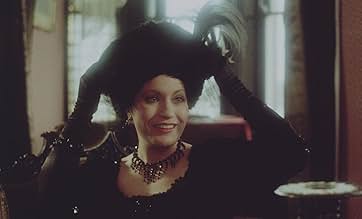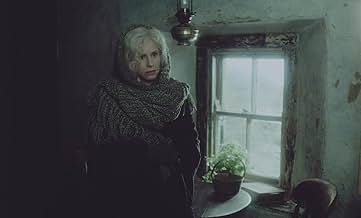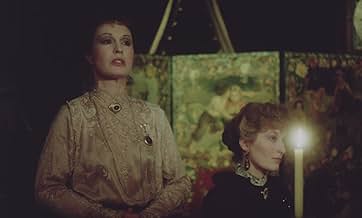Adicionar um enredo no seu idiomaA wealthy visitor to a small town befriends a midget and gets involved with two women as his behaviour becoming ever stranger.A wealthy visitor to a small town befriends a midget and gets involved with two women as his behaviour becoming ever stranger.A wealthy visitor to a small town befriends a midget and gets involved with two women as his behaviour becoming ever stranger.
- Direção
- Roteiristas
- Artistas
Vivien Heilbron
- Frederikke
- (as Vivian Heilbron)
- Direção
- Roteiristas
- Elenco e equipe completos
- Produção, bilheteria e muito mais no IMDbPro
Avaliações em destaque
This is a fascinating little film. It is based on a Knut Hamsun novel. It stars Rutger Hauer as an enigmatic agronomist who finds himself in a small town near the ocean. It has a truly European flavor. He is long on ambition and very lonely. He becomes a puzzle to the people in the town, despised by some. He befriends a midget, whom the locals actually call "Midget." He falls in love with a vain woman who rejects him and manipulates. He falls back on an older woman who lives in a hovel on the side of a hill. He seems desperate, but he is so darned weird and so full of mysteries that no one can really figure him out. He is obviously despairing of a previous life and can't seem to move ahead. He is very strong and self centered in some respects; yet, he is fragile and self destructive in others. The midget is his true friend and we find out that he has great sympathy for his plight (he is ill treated daily by the villagers), yet we find him, at times, almost as cruel as the townspeople. He becomes angry at the midget because he doesn't stand up for himself, yet he is totally closed up himself. The strength and the weakness of the film is our lack of concrete connection to the man. He is likable at times and so irrational at others. It's a film well worth watching. It was filmed on the Isle of Mann which adds to its mysterious nature.
This is one of several early Hauer flicks which wound up on video in the mid eighties (1984, here) stateside. This one is near impossible to locate and it is not worth the effort. The bassy almost incomprehensible dubbing accounts for much of this. But the plot is murky too. Hauer seems to be moping over a lost lover. If this film was meant to exploiut Hauer's fame, it failed miserably. Whatever the film makers intent, it doesn't translate well stateside (regrettably). A lot of sex and flashbacks afoot.
I could have given this review many titles, but this statement really needs pointing out.
The other thing that needs pointing out is that "faithful adaptation of the Hamsun novel" is code for "you should know what to expect".
Well, if you don't, the film's plot is akin to the plot of "Shaun of the Dead", in other words, irrelevant, a mere contrivance to have the.protagonists do something, while the only thing that matters is what their personal perspectives are doing it. Actually, the parallel to "Shaun of the Dead" doesn't stop there. The films are even about the same subject: a man trying to find happiness with a woman, and they make even somewhat similar observations, both have the craved beauty and both have the down to earth practical one. But "Mysteries" is not a comedy. I wouldn't call it a drama either, the films main intent is to provoke, although that's in the source material, the film's handling of it doesn't try to add any extra provocativeness, in other words: if you don't ponder the film like you would ponder a book, you may not feel provoked at all.
Hamsun's main lines of provocation are: Life's a joke - yes? No? (does nicely for "Shaun of the Dead" as well - again) Is man free to live his own egotistic dreams instead of paying attention to the moment? (Here it departs from "Shaun of the Dead": although that film makes it very obvious that Shaun's dreams are egotistic, there is no question that he is within his rights) Is man made to live by the standard of what he himself can understand to be the right thing? Here it gets very ugly and I will not repeat Hamsun's reasoning, something along the lines of "And if thy foot offend thee, cut it off: it is better for thee to enter halt into life, than having two feet to be cast into hell, into the fire that never shall be quenched:"
The beautiful thing about Hauer's acting is that he's not Hauer for once, but just an actor playing a role. And in this role there is one scene, just a couple of seconds, that contains the rest of his acting career, namely when he stares at the dog, which got him the casting for "Blade Runner" no doubt.
As opposed to "Shaun of the Dead" the film doesn't point out how to understand it by being absurd on the surface, but it does something similar, it uses surreal dream sequences and melodrama that doesn't quite ring true, managing reasonably well to get the viewer into a distanced mindset, although there are some scenes where it fails and only huge deviations from the style of the novel would not, owing to the differences between a novel and a film.
Well, and that's my rather lengthy review of this film.
The other thing that needs pointing out is that "faithful adaptation of the Hamsun novel" is code for "you should know what to expect".
Well, if you don't, the film's plot is akin to the plot of "Shaun of the Dead", in other words, irrelevant, a mere contrivance to have the.protagonists do something, while the only thing that matters is what their personal perspectives are doing it. Actually, the parallel to "Shaun of the Dead" doesn't stop there. The films are even about the same subject: a man trying to find happiness with a woman, and they make even somewhat similar observations, both have the craved beauty and both have the down to earth practical one. But "Mysteries" is not a comedy. I wouldn't call it a drama either, the films main intent is to provoke, although that's in the source material, the film's handling of it doesn't try to add any extra provocativeness, in other words: if you don't ponder the film like you would ponder a book, you may not feel provoked at all.
Hamsun's main lines of provocation are: Life's a joke - yes? No? (does nicely for "Shaun of the Dead" as well - again) Is man free to live his own egotistic dreams instead of paying attention to the moment? (Here it departs from "Shaun of the Dead": although that film makes it very obvious that Shaun's dreams are egotistic, there is no question that he is within his rights) Is man made to live by the standard of what he himself can understand to be the right thing? Here it gets very ugly and I will not repeat Hamsun's reasoning, something along the lines of "And if thy foot offend thee, cut it off: it is better for thee to enter halt into life, than having two feet to be cast into hell, into the fire that never shall be quenched:"
The beautiful thing about Hauer's acting is that he's not Hauer for once, but just an actor playing a role. And in this role there is one scene, just a couple of seconds, that contains the rest of his acting career, namely when he stares at the dog, which got him the casting for "Blade Runner" no doubt.
As opposed to "Shaun of the Dead" the film doesn't point out how to understand it by being absurd on the surface, but it does something similar, it uses surreal dream sequences and melodrama that doesn't quite ring true, managing reasonably well to get the viewer into a distanced mindset, although there are some scenes where it fails and only huge deviations from the style of the novel would not, owing to the differences between a novel and a film.
Well, and that's my rather lengthy review of this film.
I was happily surprised when I noticed this hard-to-find film at my local video store, since movies based on Knut Hamsun's novels are hard to come by here in the States. I'm also happy to say that this film did not disappoint. My wife and I both enjoyed it immensely.
Dutch is the original language of the film, and unfortunately they decided to dub it rather than add the less distracting subtitles. This does mar the film (when doesn't it?), but it stopped irritating me after 15 minutes or so, when I got used to it. Other than that, this movie has everything going for it. I hope that someday they will issue another version with subtitles.
Based on a novel of the Norwegian Nobel prize-winner, Knut Hamsun, this romantic psychological drama takes place during the last century and depicts a wealthy mysterious traveller, Johan Nagel (Hauer), who decides to make an extended stay in a small rural town. He becomes the immediate friend and protector of the town's much-abused midget (played wonderfully by David Rappaport), and is tormented by his feelings for two local women -- the beautiful yet spiteful and unattainable Dany Kielland (Sylvia Kristel) and the beautiful and innocent Martha Gude (Rita Tushingham). The movie was shot on location on the Isle of Man, and the picturesque natural scenery throughout adds greatly to the rich atmosphere of the film. (Nature is a prime element in Hamsun's novels.) As far as the sex goes, there are some suggestive scenes and nudity, but nothing too explicit. It's mostly left to the imagination, which is nice (quite unlike most Dutch films I've seen). The acting I thought was first-rate, and Rutger Hauer is well-cast as the unfathomable Johan Nagel. It was interesting to see Hauer in his younger days, before he crossed the Atlantic to follow his career in Hollywood.
American audiences may not take too well to this film, being that its style is very European. It reminded me of some of Ingmar Bergman's works or the recent "Breaking The Waves". However, those who have the capacity and patience to appreciate great art will be well rewarded.
Dutch is the original language of the film, and unfortunately they decided to dub it rather than add the less distracting subtitles. This does mar the film (when doesn't it?), but it stopped irritating me after 15 minutes or so, when I got used to it. Other than that, this movie has everything going for it. I hope that someday they will issue another version with subtitles.
Based on a novel of the Norwegian Nobel prize-winner, Knut Hamsun, this romantic psychological drama takes place during the last century and depicts a wealthy mysterious traveller, Johan Nagel (Hauer), who decides to make an extended stay in a small rural town. He becomes the immediate friend and protector of the town's much-abused midget (played wonderfully by David Rappaport), and is tormented by his feelings for two local women -- the beautiful yet spiteful and unattainable Dany Kielland (Sylvia Kristel) and the beautiful and innocent Martha Gude (Rita Tushingham). The movie was shot on location on the Isle of Man, and the picturesque natural scenery throughout adds greatly to the rich atmosphere of the film. (Nature is a prime element in Hamsun's novels.) As far as the sex goes, there are some suggestive scenes and nudity, but nothing too explicit. It's mostly left to the imagination, which is nice (quite unlike most Dutch films I've seen). The acting I thought was first-rate, and Rutger Hauer is well-cast as the unfathomable Johan Nagel. It was interesting to see Hauer in his younger days, before he crossed the Atlantic to follow his career in Hollywood.
American audiences may not take too well to this film, being that its style is very European. It reminded me of some of Ingmar Bergman's works or the recent "Breaking The Waves". However, those who have the capacity and patience to appreciate great art will be well rewarded.
The stranger in a small town looking for love ? It seems strange and the story does not make too much sense to me. Clearly a mystery. Other than that there is a sense of eroticism. Very light.
Você sabia?
- CuriosidadesRutger Hauer learned to play the violin for this movie.
Principais escolhas
Faça login para avaliar e ver a lista de recomendações personalizadas
- How long is Mysteries?Fornecido pela Alexa
Detalhes
Contribua para esta página
Sugerir uma alteração ou adicionar conteúdo ausente































